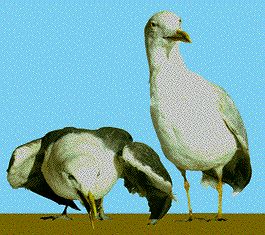Uniformitarianism

Uniformitarianism is the principle that we can infer long term trends from those we have observed over a short period. In its stronger sense it claims that processes operating in the present can account, by extrapolation over long periods, for the evolution of the earth and life.
Human experience is too brief to observe anything but evolution on a small scale. However, it is possible to imagine, by extrapolation, that if the small scale processes we have seen were continued over a long enough period they could have produced the modern variety of life.
Many creationists reject the uniformitarian principle and believe that evolution can operate within a species, but cannot produce a new species. Their reason is a belief that species differences are more than just a magnified version of the differences we see between individuals. However, if we draw on enough specimens from time and space, a strong argument can be made that organic variation is continuous, from the smallest difference between a pair of twins through to the whole history of life. Ring species such as the herring and lesser black-backed gulls (opposite) provide powerful evidence for this.
Uniformitarianism is often wrongly confused with gradualism.
| Next |



